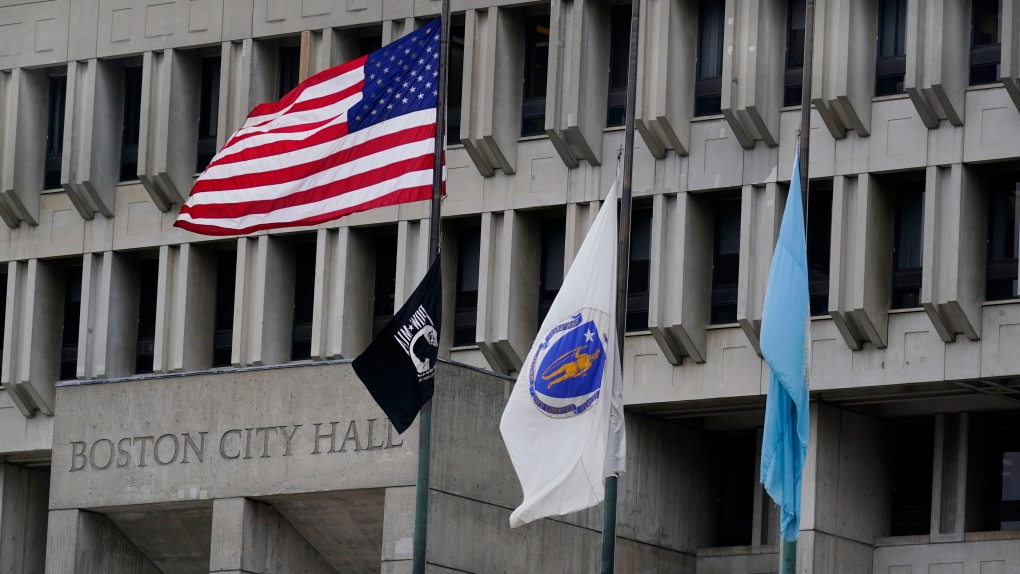
B.C. tenants evicted for landlord's use after refusing large rent increase to take over neighbouring suite
Ashley Dickey and her mother rented part of the same Coquitlam duplex in three different decades under three different landlords.
A unanimous U.S. Supreme Court ruled Monday that Boston violated the free speech rights of a conservative activist when it refused his request to fly a Christian flag on a flagpole outside City Hall.
Justice Stephen Breyer wrote for the court that the city discriminated against the activist, Harold Shurtleff, because of his "religious viewpoint," even though it had routinely approved applications for the use of one of the three flagpoles outside City Hall that fly the U.S., Massachusetts and Boston flags.
Occasionally, the city takes down its own pennant and temporarily hoists another flag.
Shurtleff and his Camp Constitution wanted to fly a white banner with a red cross on a blue background in the upper left corner, called the Christian flag, to mark Constitution Day, Sept. 17, in 2017.
The city had approved 284 consecutive applications to fly flags, usually those of other nations, before it rejected Shurtleff's because it was a Christian flag. The city said he could fly a different banner, but Shurtleff refused, and lower courts upheld the city's decision.
But the high court said the lower courts and the city were wrong. The case hinged on whether the flag-flying is an act of the government, in which case Boston can do whatever it wants, or private parties like Shurtleff, Breyer wrote.
"Finally, we look at the extent to which Boston actively controlled these flag raisings and shaped the messages the flags sent. The answer, it seems, is not at all. And that is the most salient feature of this case," Breyer wrote in an opinion that also riffed on the brutalist architectural style of Boston's City Hall and the Siena, Italy-inspired 7-acre plaza on which it sits.
Breyer wrote that "the city's lack of meaningful involvement in the selection of flags or the crafting of their messages leads us to classify the flag raisings as private, not government, speech--though nothing prevents Boston from changing its policies going forward."
The city has said that in the event of a loss at the Supreme Court it probably will change its policy to take more control of what flags can fly.
Shurtleff is a former organizer with the John Birch Society and has used his Camp Constitution website to question the Jan. 6 insurrection at the U.S. Capitol, the outcome of the 2020 election that put President Joe Biden in office, the efficacy of COVID-19 vaccines and even who was behind the Sept. 11 attacks.
None of that was at issue at the high court.
The case is Shurtleff v. Boston, 20-1800.

Ashley Dickey and her mother rented part of the same Coquitlam duplex in three different decades under three different landlords.
A man who fell into a crevasse while leading a backcountry ski group deep in the Canadian Rockies has died.
A new survey by Dalhousie University's Agri-Food Analytics Lab asked Canadians about their food consumption habits amid rising prices.
MPP Sarah Jama was asked to leave the Legislative Assembly of Ontario by House Speaker Ted Arnott on Thursday for wearing a keffiyeh, a garment which has been banned at Queen’s Park.
Charlie Woods failed to advance in a U.S. Open local qualifying event Thursday, shooting a 9-over 81 at Legacy Golf & Tennis Club.
As Donald Trump was running for president in 2016, his old friend at the National Enquirer was scooping up potentially damaging stories about the candidate and paying out tens of thousands of dollars to keep them from the public eye.
After Prime Minister Justin Trudeau said the federal government would still send Canada Carbon Rebate cheques to Saskatchewan residents, despite Saskatchewan Premier Scott Moe's decision to stop collecting the carbon tax on natural gas or home heating, questions were raised about whether other provinces would follow suit. CTV News reached out across the country and here's what we found out.
A Montreal actress, who has previously detailed incidents she had with disgraced Hollywood producer Harvey Weinstein, says a New York Court of Appeals decision overturning his 2020 rape conviction is 'discouraging' but not surprising.
Caleb Williams is heading to the Windy City, aiming to become the franchise quarterback Chicago has sought for decades.

Mounties in Nanaimo, B.C., say two late-night revellers are lucky their allegedly drunken antics weren't reported to police after security cameras captured the men trying to steal a heavy sign from a downtown business.
A property tax bill is perplexing a small townhouse community in Fergus, Ont.
When identical twin sisters Kim and Michelle Krezonoski were invited to compete against some of the world’s most elite female runners at last week’s Boston Marathon, they were in disbelief.
The giant stone statues guarding the Lions Gate Bridge have been dressed in custom Vancouver Canucks jerseys as the NHL playoffs get underway.
A local Oilers fan is hoping to see his team cut through the postseason, so he can cut his hair.
A family from Laval, Que. is looking for answers... and their father's body. He died on vacation in Cuba and authorities sent someone else's body back to Canada.
A former educational assistant is calling attention to the rising violence in Alberta's classrooms.
The federal government says its plan to increase taxes on capital gains is aimed at wealthy Canadians to achieve “tax fairness.”
At 6'8" and 350 pounds, there is nothing typical about UBC offensive lineman Giovanni Manu, who was born in Tonga and went to high school in Pitt Meadows.
 The American flag, the Commonwealth of Massachusetts flag, and the City of Boston flag, from left, fly outside Boston City Hall, Monday, May 2, 2022, in Boston. (AP Photo/Charles Krupa)
The American flag, the Commonwealth of Massachusetts flag, and the City of Boston flag, from left, fly outside Boston City Hall, Monday, May 2, 2022, in Boston. (AP Photo/Charles Krupa)